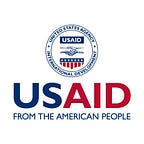After Ebola: 4 Families Who Rebuilt their Lives in Sierra Leone
USAID cash transfers helped thousands get enough to eat so families could focus on the future
In Sierra Leone, the rainy season has started. Abu Bakar Kamara and Aminata Kamara are beginning to plant their crops. Kalil Fufonah’s goat just had two kids. And Umu Kamara has a small but steady trading business.
Two years ago, Sierra Leone was in the midst of the Ebola crisis and life was very different.
Abu Bakar wasn’t able to farm, so his family relied on the UN World Food Program for food. Aminata’s husband died from Ebola, so she was forced to beg in the street for food and send one of her children to live with another family who could support her. Kalil lost his eldest son, who had cared for the family’s goats, and then Kalil lost his goats, too, because he couldn’t care for them himself. Umu lost her brother.
All suffered losses, but they knew for their families’ sake they needed to get back on their feet again. With help from USAID, and through their own motivation, they were able to do just that.
After buying food with USAID cash transfers so his family could start eating more than once a day, Abu Bakar knew his community in Mabayanko, Port Loko district needed to get back to farming.
Along with his neighbors, he created a farmers group. By pooling a tiny portion of each of their cash transfers (about 3 percent), the 25 farmers bought seeds, paid village elders a small fee to use their land, then paid laborers to prepare and plant the land.
Last year’s harvest yielded enough peanuts to sell some, eat some, save some seed, and pay the laborers. Reaping the rewards, they have already planted for the next season.
For Aminata in Makapri village of Bombali district, the relief at being able to feed her family and put a roof over their heads was palpable. During the Ebola crisis, her family was homeless and hungry, and Aminata had to beg or do chores for neighbors to get food.
After the crisis had passed, a kind neighbor took her and two of her kids in, in exchange for doing chores. Aminata used her first cash transfer from USAID to finally buy food again.
That was just the beginning of Aminata’s remarkable turnaround. Now reunited with her third child, Aminata can plan for the future. Two months ago, she got 55 pounds of rice seed through a USAID partner, and is growing seedlings nearby to plant on land given to her by her neighbor. Her business selling items such as pepper and onions at the local market enabled her to also buy peanut seeds, and will help pay for laborers to prepare her land.
Disabled from birth, Kalil from Rotenmendi village in Port Loko district already had a tough life before the Ebola crisis, but his family was managing. When he lost a son and livestock due to Ebola, things became more difficult. But through the support of his community and USAID, Kalil’s situation vastly improved. “When my family got our first cash transfer, my young son ran around the house,” he said. “Everyone was jubilant.” They immediately went to buy food.
Kalil not only received cash transfers himself, he also served in a community leadership role. His neighbors nominated him as secretary of a complaints committee — set up to handle issues around cash distribution days — and Kalil took on this role with pride. He is now sought out by his neighbors to solve other problems in the community.
Umu has led a care group for mothers for the last five years, trained under a previous USAID-funded development food assistance project. She has become well versed in encouraging fellow mothers in her community to breastfeed exclusively and spot malnutrition in children, as well as teaching moms how to take care of their kids.
This knowledge proved critical during Ebola; families were eating less, so children were more vulnerable to malnutrition. Being able to identify when their children were malnourished meant moms caught the problem early, and Umu could offer guidance on how best to treat them.
This close-knit group of mothers also banded together to form a savings group three years ago, which helped them recover financially. The savings group was thriving before Ebola, but went dormant during the crisis when no one had money to save.
The mothers used the USAID cash transfers to buy food for their families. Now that people are back on their feet, Umu and other members have been saving again to restart their small businesses and farms. Umu has already earned enough from her trading business selling small food items to reinvest in the savings group, and she even took out a loan to boost her business.
All four individuals had a vision for how to recover in the wake of the Ebola crisis. Leading by example, they are taking charge of their lives and moving their families forward towards a better life.
USAID partners with five organizations — ACDI/VOCA, CARE, Catholic Relief Services, Save the Children and World Vision — to distribute cash transfers for food in Sierra Leone. These partners have reached more than 230,000 Sierra Leoneans with cash transfers since the country was declared free of Ebola in March 2016.
About the Author
Jessica Hartl is the Acting Strategic Communications Team Leader for USAID’s Office of Food for Peace.
